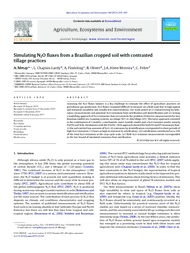Simulating N2O fluxes from a Brazilian cropped soil with contrasted tillage practices.
Simulating N2O fluxes from a Brazilian cropped soil with contrasted tillage practices.
Autoria: METAY, A.; CHAPUIS-LARDY, L.; FINDELING, A.; OLIVER, R.; MOREIRA, J. A. A.; FELLER, C.
Resumo: Assessing the N2O fluxes balance is a key challenge to estimate the effect of agriculture practices on greenhouse gas production. N2O fluxes remained difficult to measure on a field scale due to high spatial and temporal variability and usually low concentrations. Our work aimed at (i) characterizing by laboratory measurements soil potential N2O emissions from nitrification and denitrification and (ii) testing a modelling approach of N2O emissions that circumvents the problem of discrete measurements for two Brazilian rainfed rice cropping systems, no-tillage (NT) vs. disk tillage (DT). This latter approach consisted in the combination of 2 models: a mechanistic water transfer model and a N2O emission model, namely PASTIS and NOE. Simulations with the PASTIS + NOE approach showed for both NT and DT treatments that: (i) the soil emitted low amounts of N2O, (ii) emissions by denitrification corresponded to short periods of high N2O emissions (15 times as high as emission by nitrification), (iii) nitrification contributed to ca 35% of the total N2O emissions at the crop cycle scale, (iv) field N2O emission measurements corresponded to the low bound of simulated emissions from nitrification.
Ano de publicação: 2011
Tipo de publicação: Artigo de periódico
Unidade: Embrapa Milho e Sorgo
Palavras-chave: Cropping systems, Denitrificacion, Models, Nitrification, Nitrificação
Observações
1 - Por padrão são exibidas publicações dos últimos 20 anos. Para encontrar publicações mais antigas, configure o filtro ano de publicação, colocando o ano a partir do qual você deseja encontrar publicações. O filtro está na coluna da esquerda na busca acima.
2 - Para ler algumas publicações da Embrapa (apenas as que estão em formato ePub), é necessário ter, no celular ou computador, um desses softwares gratuitos. Sistemas Android: Google Play Livros; IOS: iBooks; Windows e Linux: software Calibre.
Acesse outras publicações
Acesse a Base de Dados da Pesquisa Agropecuária (BDPA) para consultar o acervo completo das bibliotecas da Embrapa.

